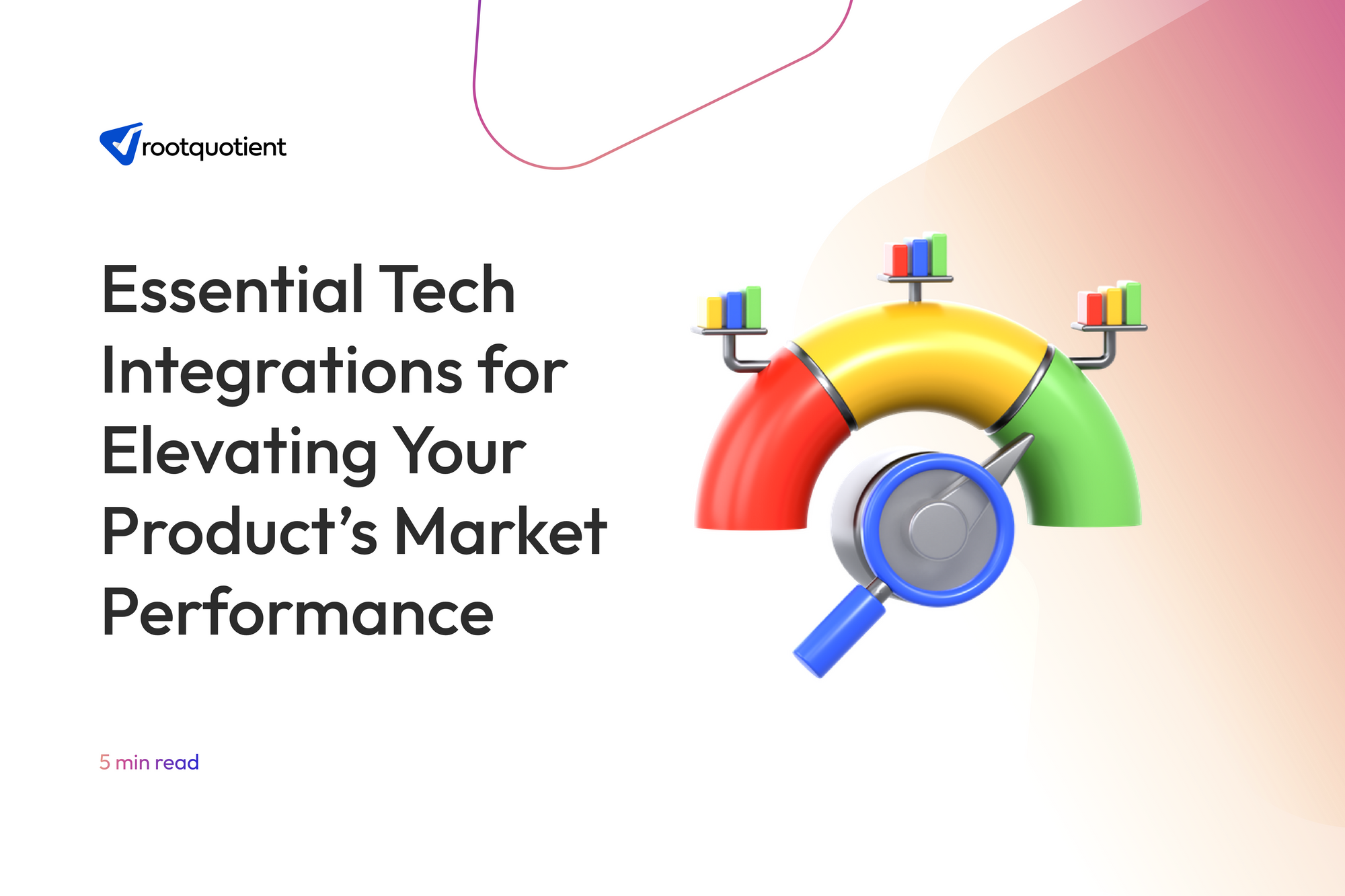Cleo’s 2023 Global Supply Chain Executive Report revealed that about 49% of senior executives attribute an increase in their company’s agility and a significant revenue boost to proactive investments in integration technology.
This staggering statistic highlights the critical role of integrations in the success of modern products. In the bustling digital marketplace, where the demand for seamless functionality and user experience is ever-increasing, integrations can be the difference between a product that merely functions and one that flourishes. By connecting different software and services, integrations not only enhance a product’s capabilities but also streamline operations and open new avenues for innovation and growth.
This guide will explore the top integrations crucial for a product’s success, delving into how these smart connections can elevate functionality, enhance user experience, and ensure a competitive edge in today’s fast-paced market.
What are Integrations?
Think of integrations as teamwork between different software. They let different apps talk to each other and share information. This teamwork helps create a system where everything works together well, making the user’s experience better and more efficient.
According to a study by Gartner, organizations that emphasize data sharing and integration are likely to outperform their peers in most business value metrics. This highlights the strategic importance of software integration in the modern business landscape.
Integrations allow separate tools to communicate and share data, thus creating an ecosystem where the whole is greater than the sum of its parts. In today’s market, where specialization of services is common, integrations help in knitting these specialized services together to deliver a comprehensive solution to the end-user.
Why Use Integrations?
Integrations are a game-changer in today’s digital ecosystem, acting as catalysts for enhanced efficiency and productivity. Understanding why you need third-party integrations becomes evident when considering the significant improvements they bring to operational processes.
A striking fact that underscores their importance is that businesses using integrations report up to a 30% increase in operational efficiency, according to a recent survey. This improvement is because integrations enable different software systems to communicate and share data seamlessly, streamlining workflows and eliminating the tedious task of manual data entry. This not only saves valuable time but also significantly reduces the risk of errors.
Furthermore, integrations expand the functionality of a product by borrowing strengths from various specialized services. For instance, integrating a customer relationship management (CRM) system with social media tools can revolutionize customer engagement and feedback processes. This synergy created by integrations is essential in today’s competitive market, where agility and responsiveness are key to staying ahead.
How Do Integrations Work With APIs?
APIs (Application Programming Interfaces) are what make integrations possible. They’re like a set of rules that let apps communicate. Think of APIs as a set of rules that apps use to talk to each other. They help different software understand and work with each other, even if they were built differently. They define the methods and data formats that applications can use to communicate. This standardization enables developers to create integrations between diverse systems, regardless of their underlying technologies.
Popular Integrations
In the digital age, the success of a software product is often determined by its ability to integrate effectively with other tools and platforms. This is where understanding why you need third-party integrations and identifying the best third-party integrations for your business application becomes crucial. Let’s explore some of the most popular integrations and how they can transform your product.
Email Integrations
Integrating email services like SendGrid or Mailchimp can revolutionize the way your product communicates. These platforms offer more than just sending and receiving emails; they enable you to automate entire email campaigns, segment audiences for targeted messaging, and track the effectiveness of each email sent. This is particularly beneficial for engaging customers, providing timely updates, and nurturing leads.
SMS Integrations
In a world where instant communication is key, SMS integrations, like those offered by Twilio, are invaluable. These integrations allow your application to send timely notifications, alerts, and promotional messages directly to a user’s mobile phone. The immediacy of SMS is unbeatable for critical communications like one-time passwords (OTPs), appointment reminders, or urgent updates.
Payment Gateway Integration
For e-commerce and online marketplaces, integrating a reliable payment gateway is non-negotiable. Payment integrations with platforms like Stripe, PayPal, or Square provide a secure and seamless transaction experience. They support multiple payment methods, including credit cards, digital wallets, and bank transfers, ensuring that every customer finds a convenient payment option. Additionally, these integrations adhere to the highest security standards, protecting sensitive financial data.
CRM Integrations
Customer Relationship Management (CRM) integrations, using platforms like Salesforce or HubSpot, empower businesses to manage customer interactions more effectively. These integrations provide a unified view of customer data, track sales interactions, and automate marketing efforts. They enable personalized customer journeys and help in identifying upselling and cross-selling opportunities, thereby driving sales and improving customer satisfaction.
Analytics and Data Visualization Integrations
Integrating analytics tools like Google Analytics or Tableau is necessary to make decisions based on data. Insights into user behavior, app performance, and key metrics like user acquisition and retention can be gained from these platforms. Businesses can improve user experience, enhance product strategies, and find growth opportunities by understanding these patterns.
Social Media Integrations
In the age of social connectivity, integrating with social media platforms can significantly increase your product’s reach and user engagement. APIs from Facebook, Twitter, and LinkedIn, for example, allow for social sharing features, social media-based logins, and access to social media data for enriched user profiles. This not only simplifies the user experience but also leverages social media’s vast user base for better engagement and marketing.
Cloud Storage Integrations
Integrations of cloud storage services like Amazon S3 or Google Cloud Storage provide safe and scalable ways to store data. These integrations are necessary for apps that work with lots of data or need to be able to access data from various locations. They offer strong backup and recovery options that protect and maintain the integrity of your data.
Map and Location Services
For applications that rely on geographical data, integrating map and location services like Google Maps or HERE Maps can add immense value. These services can prove to be the best third-party integrations for your business application. They offer detailed mapping, geolocation, and routing capabilities. They are vital for apps in logistics, travel, real estate, and any other sector where location accuracy is key.
IoT Integrations
In the realm of the Internet of Things (IoT), platforms like AWS IoT and Microsoft Azure IoT provide the backbone for managing and analyzing data from IoT devices. These integrations enable real-time data processing, device management, and insightful analytics, essential for any application operating in the IoT space.
E-commerce Platform Integrations
For businesses operating in the e-commerce domain, integrating with platforms like Shopify or Magento can streamline the entire e-commerce process. These integrations offer comprehensive solutions for product management, inventory tracking, and providing a seamless shopping experience. They are key to creating an efficient, user-friendly online store.
In conclusion, the strategic selection and implementation of integrations are crucial for the success of a product in today’s competitive market. Integrations, particularly those with APIs, third-party services, and popular platforms like email, SMS, and payment systems, are key to enhancing features, ensuring scalability, and improving the overall user experience. By carefully considering what integrations to use and how to implement them, businesses can significantly elevate the functionality and appeal of their applications, paving the way for greater success and customer satisfaction.



